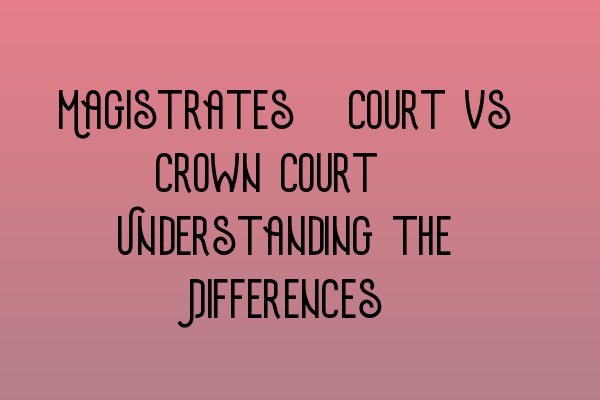Magistrates’ Court vs Crown Court: Understanding the Differences
When it comes to criminal proceedings in the UK, understanding the differences between Magistrates’ Court and Crown Court is essential. Each court has its own jurisdiction, powers, and procedures, which can significantly impact the outcome of a case.
The Basics: Magistrates’ Court
Magistrates’ Court, also known as the lower court, is where the majority of criminal cases are initially heard. It deals with less serious offenses, such as minor theft, common assault, and traffic violations. Magistrates, who are not qualified lawyers but are legally trained, preside over the proceedings. They make decisions on guilt or innocence and impose sentences in line with their powers.
One of the main advantages of Magistrates’ Court is its accessibility and efficiency. Cases are usually heard much faster than in Crown Court, saving time and costs for all parties involved. Additionally, Magistrates’ Court is designed to serve local communities, making it more convenient for witnesses and defendants to attend.
If you are preparing for the SQE exams, it is crucial to understand the differences between these two types of courts. The SQE 1 Practice Exam Questions can help you familiarize yourself with the various legal concepts and procedures involved in criminal law.
The Crown Court: Handling Serious Offenses
Crown Court deals with more serious criminal offenses, such as murder, rape, and high-value fraud. It has the power to impose longer sentences and has access to a wider range of legal resources. Judges, who are experienced and qualified lawyers, preside over the proceedings. In serious cases, a jury of 12 members is selected to determine guilt or innocence.
Unlike Magistrates’ Court, Crown Court requires the presence of a barrister or solicitor to represent the defendant. The complex nature of these cases often requires a higher level of legal expertise and preparation. SQE 2 Preparation Courses can provide the necessary guidance and resources to help you navigate the challenges of Crown Court proceedings.
It is important to note that some cases start in Magistrates’ Court but are later transferred to Crown Court if they are deemed more serious. This transfer can happen at various stages of the proceedings and is typically based on the severity of the offense.
Which Court is Right for Your Case?
Determining whether your case should be heard in Magistrates’ Court or Crown Court depends on various factors, including the nature and seriousness of the offense. In certain situations, defendants may choose to have their case heard in Crown Court for the opportunity to have a trial by jury.
If you’re preparing for the SQE exams, understanding the different scenarios in which cases are allocated to different courts is crucial. The SRA SQE Exam Dates can provide you with information on the dates and structure of the exams.
In conclusion, while both Magistrates’ Court and Crown Court play vital roles in the UK’s criminal justice system, they differ in terms of jurisdiction, potential sentences, and procedures. Familiarizing yourself with these differences and the intricacies of each court can make a significant difference in your legal career.
Remember, preparation is key. Consider taking advantage of SQE 1 Preparation Courses and SQE 1 Practice Mocks FLK1 FLK2 to strengthen your understanding and improve your chances of success in the SQE exams.
For more information on the SQE exams or to explore our range of SQE preparation courses, visit the FQPS website today.
